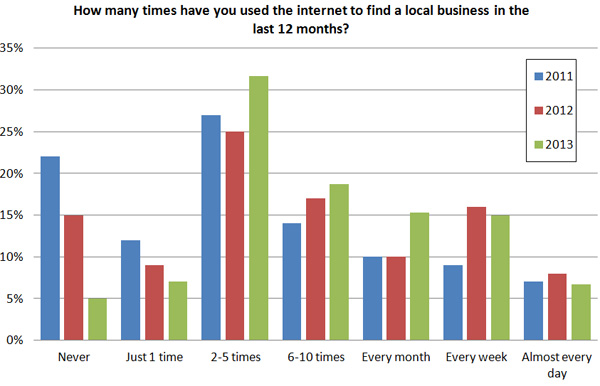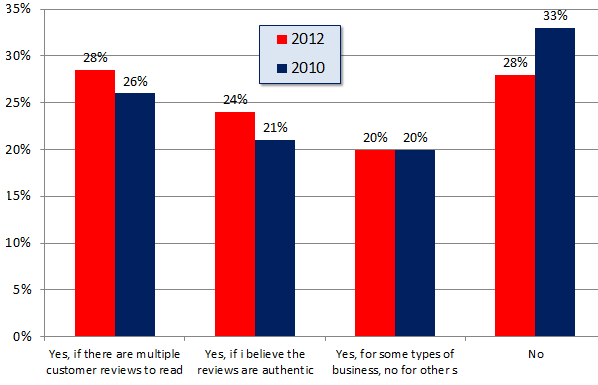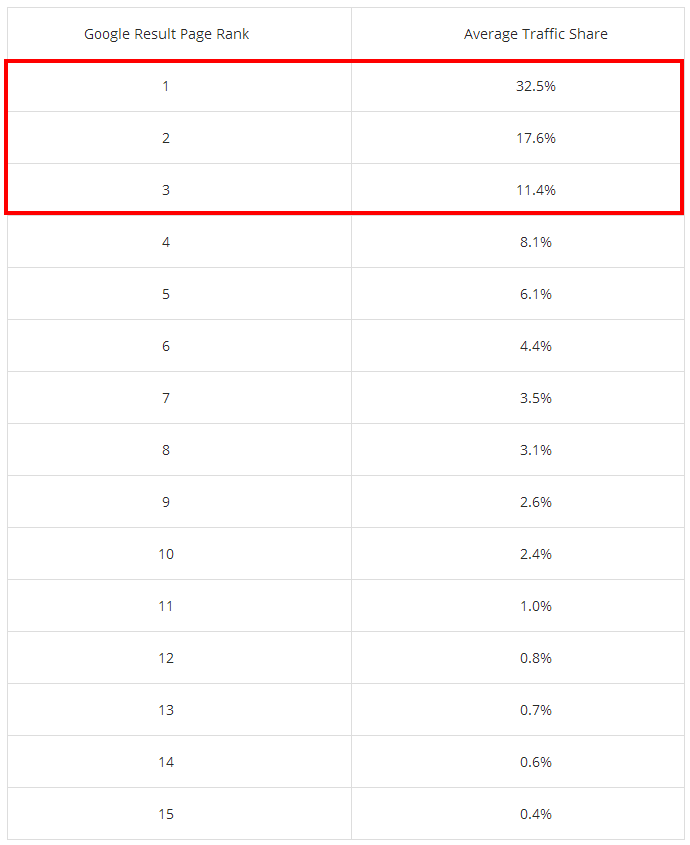Consumer reviews can make or break a business online. This report investigates consumer reviews and business trends that can help you stand out in your industry.
Few things are more damaging to a brand or business than when one says, “Our business isn’t online, so we don’t have to worry about someone attacking our brand.”
Not only is that statement ridiculous, but it’s also horribly wrong! Without an online presence and not monitoring what and where things are being said about your brand, you might as well not even have a brand or business in the first place.
Today, we are going to look at three different industry stats on reputation management and the first impression consumers receive when they search for brands online. If these stats don’t startle you and make you want to have total control over how your brand looks online, then you likely never will.
85% of Consumers are Searching for Local Businesses
It’s not a question of whether or not people are searching for your local business online; it’s simply a matter of “how often” and what they find.
A report from SearchEngineWatch reports that up to 85% of consumers read local business reviews. The graph below shows how often consumers search for brands online, with 2-5 times over the past 12 months leading the way.

While the data from the report and chart are extremely effective for understanding how often people search for businesses and brands online, it’s safe to assume these numbers are much higher now that everyone has access to mobile devices and Google ranks local content much higher in the search results.
Now, the question to ask yourself is, what are your potential consumers finding when they search for your local brand or business? If your site and content aren’t ranking for multiple positions on the main page of Google, your reputation could be in jeopardy.
72% of Consumers Trust Online Reviews as Much as Personal Recommendations
Remember the last time a friend or family member recommended a service or product for you to buy? You likely took their recommendation to heart and knew they wouldn’t steer you in the wrong direction. In most cases, you would probably even buy the product if you saw it while you were out shopping—simply because it was recommended by someone close to you.
How would you feel if you saw a review online for a product you were considering buying? Remember that you don’t know who wrote the review or if it might even be a paid advertisement.
The scary truth is that 72% of consumers trust online reviews as much as personal recommendations from close friends or family! Consumer reviews have a powerful effect on whether or not a potential customer will visit your establishment.
SearchEngineLand has a great article full of interesting stats on how online recommendations and reviews change how people research and impulse buy online.
Q6: Do you trust online customer reviews as much as personal recommendations?
What does this mean for your brand or business? It means two things: that the value of your “real” recommendations from friends, family, and existing customers is diminishing, and that you need to aggressively promote any positive reviews and testimonials you might have through your website, blog, and other review sites.
Not only do you need to have your own reviews out there, but you also need to actively monitor existing mentions, reviews, and complaints. More than anything else, these survey responses prove that online reviews and what consumers find online about your brand are more important than ever before.
The #1 Organic Result in Google Drives 33% of Clicks
We continually discuss on this blog the importance of ranking at the top of the search results for your brand name and all relevant terms. If you aren’t ranking in the first position, you are not only leaving yourself open to potential vulnerabilities and attacks, but you are also missing out on a lot of traffic.
There are many ways to rank in Google’s search results. The most powerful is through organic listings (non-paid). Not only are these the most valuable rankings in Google’s eyes, but they are also the most clicked-on listings by search users.
Protofuse reports that the first organic listing receives 33% of all clicks, and the first three combined listings receive over 61%.
What does this mean for your brand and online reputation? Simple: If you aren’t ranking number one in Google, you might as well not rank at all.
Refer to our article on search ranking keywords to learn about the many different ways to rank at the top of the search results outside of your personal and business name.
Your Online Reputation is What Consumers See First
Referring back to our beginning statement in the article, your business or brand is online whether you want it to be or not. The question is, instead, whether or not you are going to rank at the top of the search results when someone searches for your brand online. If not, they are likely to end up on a random review site that you have no control over. Remember that consumer reviews shape purchasing decisions; review management is the key to unlocking the potential behind this customer feedback.
The good news is that it’s never too late to get started with online reputation and repair any damage already done. Follow our reputation management tips and implement a strategy that works for your organization to ensure you leave a great first impression representing the brand you’ve worked so hard to build.
You might also like
5 Tools to Monitor Online Reputation Management
Consumer reviews can make or break a business online. This report investigates consumer reviews and business trends that can help …


